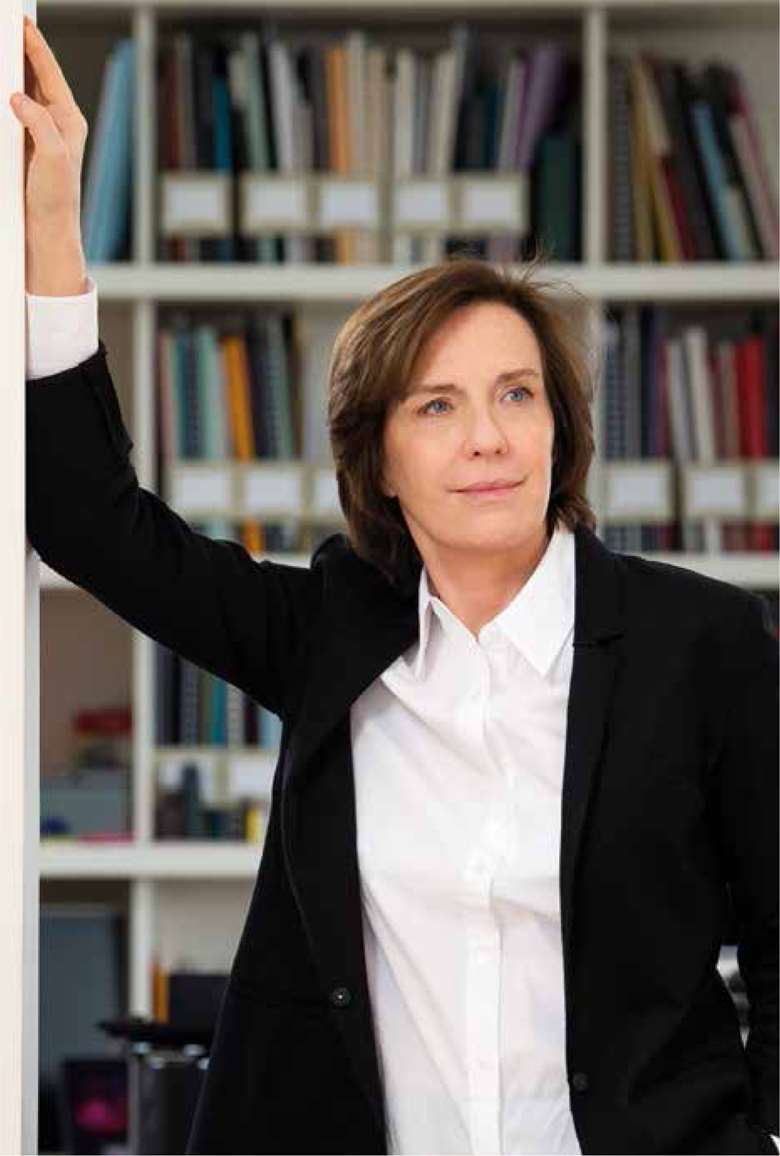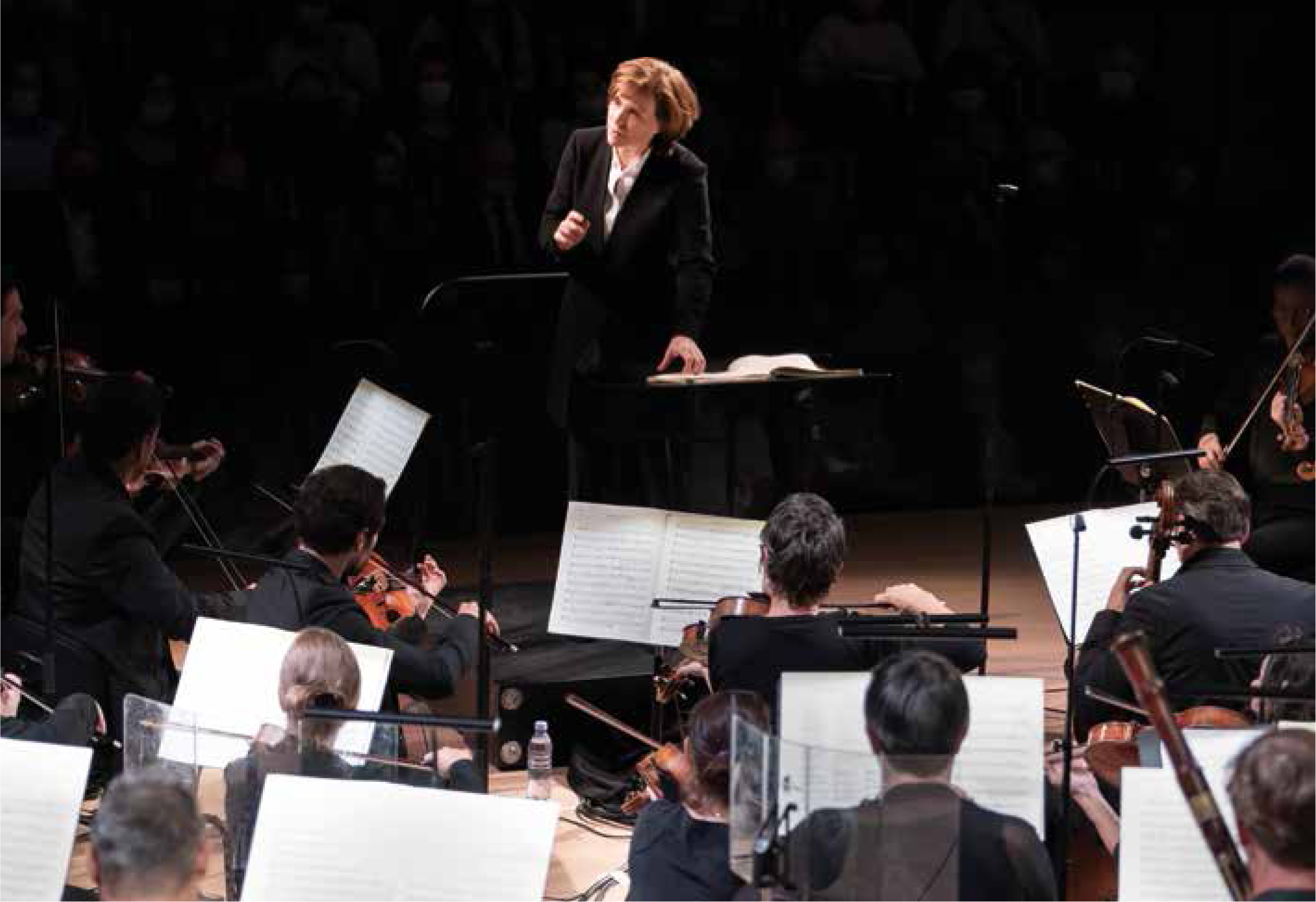David Hill in conversation with... Laurence Equilbey (founder-director of Accentus chamber choir)
David Hill
Friday, December 2, 2022
'We are proud to be part of the rightful restoration of the place of female creators in musical history'

© JULIEN BENHAMOU
DH: What is your favourite drink?
LE: A good bottle of red Burgundy – Hautes côtes de Beaune. It is a light-textured wine, very fruity, which goes very well with all dishes.
DH: What is your favourite cuisine?
LE: I like light French cooking, rather vegetarian or a little fish, but with a lot of flavour and herbs, like in Provence. No cream at all, rather olive oil or spices – Retour des Indes by Chef Roellinger. For desserts, I like airy textures, not too sweet.
DH: Bach or Handel?
LE: I like both, but not for the same reasons. Bach leaves a deep and indelible mark because of the depth of his discourse. The Mass in B minor remains an unequalled masterpiece; and the Passions and some cantatas are overwhelming for someone who values spirituality.
Handel moves me for his panache, for his joy and energy, for his knowledge of feelings. ‘Scherza infida’ in Ariodante remains one of my favourite pieces in the world, and has saved me in times of loneliness.
DH: Ravel or Debussy?
LE: The comparison between the two previous composers could be mirrored for these two. I love Debussy for his musical paths – he was one of the few to take them – and for his deep subtlety, his sonic abstraction at times. La mer always gives me a feeling of incredible transcendence.
Ravel may seem more superficial, but no one else could have written La valse, the slow movement of the Concerto in G for piano, or ‘Lever du jour’ in Daphnis et Chloé.

Equilbey conducts Insula, the resident orchestra of the music and performing arts centre La Seine Musicale © JULIEN BENHAMOU
DH: When did your musical life begin and who were your teachers and mentors?
LE: I come from a family of music lovers. My parents listened to a lot of music and some of my ancestors were violin or piano makers – so, a good seedbed. I spent my early childhood in Germany, where I stored up deep feelings, listening to choirs or orchestras. Then I went to a girls' boarding school, where I took piano and flute lessons and sang a lot. Later, I took classes in harmony, counterpoint, analysis and composition at the Conservatoire and the Sorbonne in Paris. At the age of 20, I decided to dedicate myself to conducting.
My character helped me to realise this dream. I have always had a rebellious streak, and like to be in charge. I love working with a score and its context, and also the way the music flows through the arms and body when conducting, much like a dancer. This led me to Vienna to study conducting. Nikolaus Harnoncourt was one of the pioneers of the revival of Baroque music in the 1970s. During my studies, he made me realise that the desire for historical authenticity, such as playing on period instruments, is not only a matter of historical truth; it is also a way to get closer to the composer, to the truth of his work, to what he had to tell us. This approach allows a very old work to resonate in our time. I have given many concerts under Harnoncourt's direction; he both taught and inspired me a lot. He is an intellectual and a great musicologist, but he is also a man of the theatre and a poet of sound. He was very important in my artistic development.
Of course, other musical personalities also had a great influence on my career, like Eric Ericson in terms of choir directing – he had very expressive body movements. And for conducting, I had several mentors. I studied with the Finnish conductor and pedagogue Jorma Panula. In England there was Denise Ham and Colin Metters; and I mustn't forget Hideo Saito, who worked with Seiji Ozawa – he was a role model for any young conductor. In Vienna, I studied at the Conservatoire and saw many great conductors; I sang under them and I observed them. Afterwards, all these influences are brought to bear as you create your own relationship with your body and develop your own personality and gestures.
DH: What are your main positions and how do you work your creativity within your role as conductor?
LE: The first thing is to choose the works. For that I have a roadmap. There is, of course, Beethoven, which we are exploring progressively with Insula [resident orchestra of the music and performing arts centre La Seine Musicale], always on the lookout for rarities. And there is Mozart with the Mozart Maximum festival. These composers are two very important axes. We also play a lot of Bach and Handel, without going back further in time. The German pre-Romantics are particularly important – Weber, Schubert and Schumann. We also include French composers like Berlioz, or Louise Farrenc [1803-75]. After a project devoted to her symphonic works, we'll be presenting the work of her contemporary Emilie Mayer.
It is essential to have studied the work well. I usually start a year before. I immerse myself in the structure to have the right orientation. I try to understand the genesis, to be as historically informed as possible about the time and circumstances of the performance, in order to be as close as possible to its veracity and its DNA.
Afterwards come the first rehearsals with the musicians, bringing everyone's musicality and energy together. Seneca said, ‘One must be followed rather than guided.’ My role is more to inspire than to lead. During rehearsals I try to adjust the balance between the instruments, the intonation, to have clear and varied tempi, to hold the orchestra, to lead the phrasing, to inspire the musicians.
Finally, the day of the concert arrives. I have a fairly precise schedule, and above all I don't change it at the last minute. I don't work the morning of the performance. I don't listen to anything musical, so that my ears are not tired by the evening. The most important thing on the day of the concert is to be in maximum listening mode. Before going on stage, I think about the piece I'm about to direct: its dramaturgical signposts, the energy, the human feelings it conveys.
DH: How is the choral scene in France following the pandemic?
LE: Everyone is returning to rehearsals and concerts. It's difficult for the public to go to concerts again and broadcasting concerts is also more difficult than before. But the enthusiasm of the artists is evident!
Everyone is wondering what this crisis teaches us about our professions. I already think that the models that survive are those with a demanding and audacious artistic policy, but also a very dynamic audiovisual and educational policy. It is also necessary to give more meaning to choir tours – link them to mini-residencies when possible. Also, try not to programme three years in advance – that's too much!
During this period, we learned that things had to change. Apart from music, we have to deal with the problems of intensive animal breeding, of selling wild animals in appalling hygienic conditions. We still don't know how exactly Covid-19 came about; if we don't adjust, it can start again very quickly.
DH: Are there any composers and works you'd find it difficult to live without?
LE: As Pablo Casals used to say, when asked which Bach suite he preferred, he would answer: ‘The one I am working on!’ Rather than composers, I would mention pieces that will haunt me all my life. The list is quite long, as I add to it every year. Among the composers, Bach, Beethoven or Schumann.
DH: What's coming up in your musical life you would like to mention?
LE: I am proud to complete with Insula orchestra the recording for the Erato label (Warner Classics) of the complete symphonies and overtures of the 19th-century French composer Louise Farrenc. This music was rarely heard during her lifetime, or was erased from the repertoire at the end of the 19th century. It is our duty to interpret them with the greatest possible care, so that they may finally find their rightful place in symphonic programmes and on disc.
Insula orchestra crossed paths with Louise Farrenc for the first time in 2018. This was not the first time we have tackled the repertoire of female composers; but in Farrenc we discovered an artist who is destined to take a special place in our repertoire. Her music is of unparalleled inspiration and quality in mid-19th-century Paris. I find in her a beautiful mastery of musical forms, all the subtleties of the sonata form, as well as a formidable melodic inventiveness: thus armed, she cultivates the art of musical discourse with efficiency and finesse. Faced with the work of this pioneer, the idea of playing her works on period instruments is obvious. They bring a lot of colour and dynamism to these works.
I'm sure these symphonies will become part of the standard orchestral repertoire in the near future. We are proud to be part of the rightful restoration of the place of female creators in musical history.






